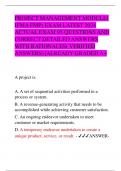PROJECT MANAGEMENT MODULE(
IFMA FMP) EXAM LATEST 2024
ACTUAL EXAM 95 QUESTIONS AND
CORRECT DETAILED ANSWERS
WITH RATIONALES( VERIFIED
ANSWERS) |ALREADY GRADED A+
A project is:
A. A set of sequential activities performed in a
process or system.
B. A revenue-generating activity that needs to be
accomplished while achieving customer satisfaction.
C. An ongoing endeavor undertaken to meet
customer or market requirements.
D. A temporary endeavor undertaken to create a
unique product, service, or result. - ✔✔✔ANSWER-
,D. A project is a temporary endeavor undertaken to
create a unique product, service, or result.
Managing a project typically includes:
A. Balancing the competing project constraints,
which include scope, quality, schedule, budget,
resources, and risks.
B. Integrating requirements of profitability, low cost,
and legal responsibility.
C. Implementation of software, hardware, and other
systems to enhance organizational efficiency.
D. Supporting human factors, communications,
discipline, and performance management. -
✔✔✔ANSWER-A. Balancing the competing project
constraints, which include scope, quality, schedule,
budget, resources, and risks. Managing a project
typically includes:
,A. Balancing the competing project constraints,
which include scope, quality, schedule, budget,
resources, and risks.
B. Integrating requirements of profitability, low cost,
and legal responsibility.
C. Implementation of software, hardware, and other
systems to enhance organizational efficiency.
D. Supporting human factors, communications,
discipline, and performance management. -
✔✔✔ANSWER-A. Balancing the competing project
constraints, which include scope, quality, schedule,
budget, resources, and risks.
Project management is:
A. The integration of the critical path method and
the Earned Value Management system.
B. The application of knowledge, skills, tools, and
techniques to project activities to meet the project
requirements.
, C. The application of knowledge, skills, wisdom,
science, and art to organizational activities to
achieve operational
excellence.
D. A subset of most engineering and other technical
disciplines. - ✔✔✔ANSWER-B. Project
management is the application of knowledge, skills,
tools, and techniques to project activities to meet
project requirements.
Managing a project typically includes, but is not
limited to:
n Identifying requirements;
n Addressing the various needs, concerns, and
expectations of the stakeholders in planning and
executing the project;
n Setting up, maintaining, and carrying out
communications among stakeholders that are active,
effective, and collaborative in nature;




